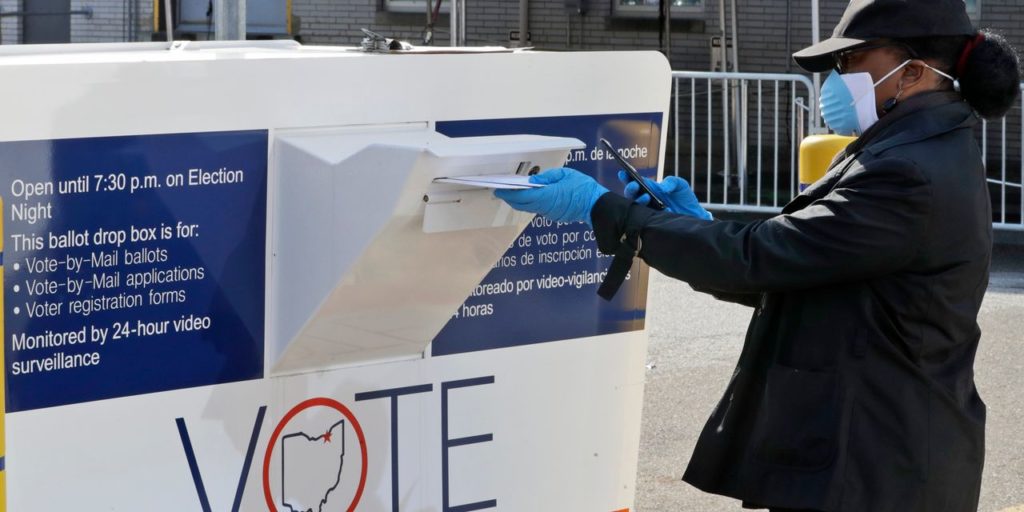Tags
An Election Day Success, Colorado voting, David Leonhardt, FiveThirtyEight, Lee Drutman, NYTimes, NYtimes Daily Briefing, Universal System of Voting by Mail, Vote at Home, Voting by Mail

From today’s NYTimes Daily Briefing by David Leonhardt:
An Election Day Success:
Voters didn’t have to wait in long lines. Turnout was high. And result were available shortly after the polls closed.
Sounds almost too good to be true, doesn’t it?
It’s not. It is a description of yesterday’s primary in Colorado.
The sate avoided the miserable lines that voters in Georgia and Wisconsin recently endured — lines that are a waster of time and, even worse, a health risk during a pandemic.
And, unlike in Kentucky and New York, Colorado, didn’t take a week or more to count its ballots. It began counting before Election Day. After polls closed at 7 p.m., people quickly knew that John Hickenlooper had won the Demoncratic nomination in a closely watched Senate race.
Colorado accomplished all of this thanks to a universal system of voting by mail, which began in 2014. The state sends a ballot to every registered voter weeks before Election Day. Voters can return the ballot by mail, so long as it arrives by Election Day, or can drop it off at any of one of a dozen voting centers.
People can also vote in person, but fewer than 6 per cent of voters do so in a typical election, said Amber McReynolds, the former head of elections in Denver, who now runs Vote at Home, an advocacy group. The atmosphere at Denver polling places yesterday, she told me, was calm as can be.
Hawaii, Oregon, Utah and Washington also created universal vote-by-mail systems before the pandemic struck. In all these dates, turnout has increase, with no net benefit for either party. Many other states are trying to expand mail voting this year, although often without universal mailing of ballots or as many drop-off locations as Colorado has.
What stuck me most about this article was what I learned when I pursued Leonardt’s statement that there was “no net benefit for either party.”
*Check out FiveThirtyEight’s extensive look at this issue: There Is No Evidence That Voting By Mail Gives One Party An Advantage by Lee Drutman.


liz Frost said:
I have voted by mail since 2000. Larry and I taught our children to vote by mail. To date Edmond, Elizabeth, and I have voted in in ever primary, local, state, and federal election. The voting records are “up to date”.
Secondly, the military use mail in ballots.
Sean McLaughlin said:
Just to let ya know…..I’ve voted the last 8-10 years by mail without any problems….
I even check with the local admin people who work in the building (at their suggestion) to make sure my envelope (with my signature on it) arrived safe and sound….they always come back and tell me it arrived (or not). If arrived, they will tell me when I sent it….etc etc.
NO PROBLEMS–to date– IN ALL THESE YEARS — WHETHER I’M LOCAL OR NOT!!
SEAN
Samuel clover jr. said:
Good evening Rick, well I actually like voting in person since that is my style ,however just as long as you exercise your right to vote…we need to not sit on the sidelines….considering where we find ourselves currently as a nation…..mr. Sam peace smiles thanks Texas
Anon-2 said:
We know that this upcoming election will be a disaster. The losing side will accuse the winning side of fraud.
Articles like this are laying the groundwork.
Just because anecdotally people “have voted by mail for years with no problem”….how do you know that election wasn’t stolen?
Just watch Billy Bulger on an old 60 minutes, they JOKE about stealing elections, they have it down to such an art: “you never know the final results until all the ballots are in from St. Augustine’s cemetery”.
I think this election especially……absentee voting allowed, military procedures for mail allowed……everyone else….in person, on the day, with a valid ID.
Anon-2 said:
AAAnnnnnnd, once again, your friend Anon-2 nailed it.